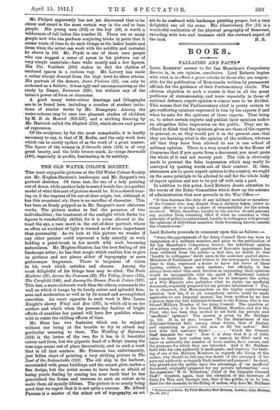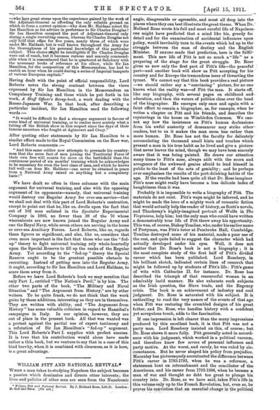BOOKS.
FALLACIES AND FACTS.*
LORD ROBERTS' answer to Sir Ian Hamilton's Compulsory Service is, in our opinion, conclusive. Lord Roberts begins with what is in effect a grave rebuke to those who are respon- sible for the publication of Memoranda written by permanent officials for the guidance of their Parliamentary chiefs. The obvious objection to such a course is that in all the great problems of statesmanship, and more especially in those of national defence, expert opinion is almost sure to be divided. This means that the Parliamentary chief is pretty certain to get conflicting opinions expressed to him by his experts if and when he asks for the opinions of those experts. That being so, to select certain experts and publish their opinions makes an altogether false impression on the public. They are in- clined to think that the opinions given are those of the experts in general, or, as they would put it in the present case, that they are learning what is the opinion of the soldiers, whereas all that they have been allowed to see is one school of military opinion. There is a very sound rale in the House of Commons that if you quote from a document, you must quote the whole of it and not merely part. The rule is obviously made to prevent the false impression which may easily be conveyed by quoting words out of their context. If, then, statesmen are to quote expert opinion to the country, we ought on the same principle to be allowed to call for the whole body of expert opinion and not to be put off with only a part.
In addition to this point, Lord Roberts draws attention to the words of the Esher Committee which drew up the scheme of administration that now prevails in the War Office :—
" It thus becomes the duty of any military member or members of the Council who may dissent from a decision taken, either to resign office or to accept a share of responsibility for the action involved. While, therefore, loyalty to the service should prevent any member from retaining office if what he considers a vital principle of policy is contravened, loyalty to colleagues will prevent the opinions of individual members from becoming known outside• the Council-room."
Lord Roberts proceeds to comment upon this as follows
"Since the appointment of the Army Council there has been no resignation of a military member, and prior to the publication of Sir Ian Hamilton's Compulsory Service the individual opinion of military members on all questions of first-rate importance has been withheld from the public—a fact due, no doubt, to that loyalty to colleagues' dwelt upon in the sentence quoted above. Members of Parliament and writers to the newspapers have, from time to time, expressed a desire to know the views of these leading soldiers upon such matters ; but officially, it has always been ruled that such freedom in. expressing their opinions would be incompatible with the spirit of Ministerial control and responsibility.. How, then, are we to interpret the action of a War Minister who publishes what he styles 'an unofficial document, originally prepared for my private information' ? Per, be it observed, this Memorandum on the highly controversial question how far, if at all, compulsory service could be made applicable to our Imperial system,' has been 'written by no less a person than the late Adjutant-General to the Forces, who is the Second Military Member of the Army Council. The question at once arises, why is it the Second Military Member, and not the First, who has been thus invited to set forth his private and 'unofficial' opinion? The answer is given by Mr. Haldane (p. 10). It is, he says, because 'To the Department of the Adjutant-General falls, among other duties, that of finding and organising in peace the men to fill the cadres.' But how does this sentence finish ? which the General Staff demands for war' ! Now it is clear that it is of little value to learn how cadres can, or cannot, be filled until we know on authority the number of these cadres, their nature, and the purposes for which they are intended. And if Mr. Haldane feels that his own authority is inadequate,-and requires the back.' ing of one of his Military Members as regards the filling of the cadres, why should he feel any less doubt of the adequacy of his personal authority as Fogalra their nuffibeeitila purpose ? In short, why ihould not the public have „the advantage of. 'an unofficial document, originally prepared for my private information; over the signature W. G. Nicholson;_,Chief of the Imperial General ' gaff ? Granted, again, that the attention of the Secretary of State for War, and, through him, that of the public, is to, be con. lined for the moment to the Suing of cadres, why does Mr. Haldane • ranatia and Faits,. By Ftekt-Maxelial Earl'Itoberia tondOni 4o1in Hurray. [2s. 6d. net.] --who lays great stress upon the experience gained by the work of the Adjutant-General as affording the only reliable ground on which to form a correct opinion—why does Mr. Haldane select Sir Ian Hamilton as his adviser in preference to Sir Charles Douglas ? Sir Ian Hamilton occupied the post of Adjutant-General only during a single recruiting season, whereas Sir Charles Douglas not only held that office for five years, nearly three -of which were under Mr. Haldane, but is well known throughout the Army for the thoroughness of his personal knowledge of this particular subject. This choice might be intelligible if Sir Charles Douglas were out of reach, but it becomes curious and scarcely commend- able when it is remembered that he is quartered at Salisbury with the necessary books of reference at his elbow, while Sir Ian Hamilton, for the composition of this Memorandum, has bad to snatch an hour when he could during a series of Imperial banquets at various European capitals."
Having dealt with the point of official responsibility, Lord Roberta notes the strong contrast between the views expressed by Sir Ian Hamilton in the Memorandum on Compulsory Training and those which he put forth in his work, A Staff Officer's Scrap-book, a work dealing with the Russo-Japanese War. In that book, after describing a
particular incident, Sir Ian Hamilton used the following words :—
" It would be difficult to find a stronger argument in favour of some kind of universal training, or to realise more acutely what a falling off the British show in this respect since the days of their famous ancestors who fought at Agincourt and Crecy."
After quoting other statements by Sir Ian Hamilton to a similar effect made to the Royal Commission on the Boer war, Lord Roberts comments :— "And this same soldier now attempts to persuade his country- men that the mere fact of men joining the Territorial Force of their own free will counts for more on the battlefield than the continuous period of six months' training which he acknowledges to be necessary for even the best class of man, and which he knows full well—as does Mr. Haldane—can never be obtained in peace from a National Army raised on anything but a compulsory basis 9:" We have dealt so often in these columns with the main argument for universal training, and also with the opposing argument of its opponents—namely, that universal training would destroy our Regular Army for over-sea service—that we shall not deal with this part of Lord Roberts's contention, except to point out that he, like us, dwells upon the fact that out of 102 men enlisted in the Spectator Experimental Company in 1906, no fewer than 38 of the 76 whose whereabouts are now known joined the Regular Army and one the Royal Navy, while seven others are serving in the home or over-sea Auxiliary Forces. Lord Roberts, like us, regards these figures as significant, and also, like us, considers that even more important is the fact that those who use the " fed- up" theory to fight universal training rely whole-heartedly upon the Special Reserve to fill up the ranks of the Regular Army. Yet according to the "fed-up " theory the Special Reserve ought to be the greatest possible obstacle to recruiting. Instead of getting men into the Regular Army, it ought, according to Sir Ian Hamilton and Lord Haldane, to scare them away from it.
Before we leave Lord Roberts's book we may mention that only Part I., entitled " The Nation's Peril," is by him. The other two parts of the book, " The Military and Naval Situation" and "The Argument from History," are by other writers. To be quite frank, we do not think that the work gains by these additions, interesting as they are in themselves. They are written with ability, and " The Argument from History" has some valuable criticism in regard to Hannibal's campaigns in Italy. In our opinion, however, they are out of place in the present book. All that was wanted was a protest against the partial use of expert testimony and a refutation of Sir Ian Hamilton's " fed-up " argument. This Lord Roberts's Part I. supplies with perfect success. It is true that his contribution would alone have made rather a thin book, but we venture to say that in a case of this kind brevity, when it is combined with clearness, as it is here, is a great advantage.





































 Previous page
Previous page